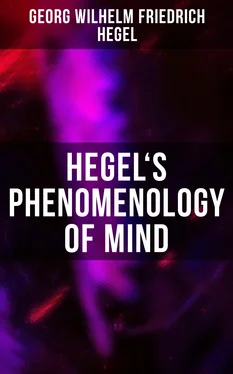Georg Wilhelm Friedrich Hegel
Hegel's Phenomenology of Mind
System of Science

Books
OK Publishing, 2020
musaicumbooks@okpublishing.infoTous droits réservés.
EAN 4064066309978
Preface: On Scientific Knowledge
Introduction
A. Consciousness
I. Certainty at the Level of Sense-Experience — The “This”, And “Meaning”
II. Perception: Or Things and Their Deceptiveness
III. Force and the Understanding-The World of Appearance and the Supersensible World
B. Self-Consciousness IV. The Truth which Conscious Certainty of Self Realizes
A. Independence and Dependence of Self-Consciousness Lordship and Bondage
B. Freedom of Self-Consciousness Stoicism: Scepticism: The Unhappy Consciousness
C. Free Concrete Mind V. Reason’s Certainty and Reason’s Truth A. Observation as a Process of Reason
A (1). Observation of Nature
B. Observation of Self-Consciousness in its Pure Form and in its Relation to External Reality — Logical and Psychological Laws
C. Observation of the Relation of Self-Consciousness To its Immediate Actuality — Physiognomy and Phrenology.
B. The Realization of Rational Self-Consciousness Through its Own Activity
A. Pleasure and Necessity
B. The Law of the Heart, and the Frenzy Of Self-Conceit
C. Virtue and the Course of the World
C. Individuality, which Takes Itself to Be Real In and for Itself
A. Society as a Herd of Individuals: Deceit: "Actual Fact"
B. Reason as Lawgiver
C. Reason as Testing Laws
VI. Spirit A. Objective Spirit — The Ethical Order
A. The Ethical World: Law Human and Divine: Man and Woman
B. Ethical Action. Knowledge, Human and Divine. Guilt and Destiny
C. The Condition of Right or Legal Status
B. Spirit in Self-Estrangement — The Discipline Of Culture
I. The World of Spirit in Self-Estrangement
II. Enlightenment
III. Absolute Freedom and Terror
C. Spirit in the Condition of Being Certain of Itself: Morality
A. The Moral View of the World
B. Dissemblance
C. Conscience: The “Beautiful Soul”: Evil and the Forgiveness of it
VII. Religion A. Natural Religion
A. God as Light
B. Plants and Animals as Objects of Religion
C. The Artificer
B. Religion in the Form of Art
A. The Abstract Work of Art
B. The Living Work of Art
C. The Spiritual Work of Art
C. Revealed Religion
VIII. Absolute Knowledge
Preface: On Scientific Knowledge
Table of Contents
In the case of a philosophical work it seems not only superfluous, but, in view of the nature of philosophy, even inappropriate and misleading to begin, as writers usually do in a preface, by explaining the end the author had in mind, the circumstances which gave rise to the work, and the relation in which the writer takes it to stand to other treatises on the same subject, written by his predecessors or his contemporaries. For whatever it might be suitable to state about philosophy in a preface — say, an historical sketch of the main drift and point of view, the general content and results, a string of desultory assertions and assurances about the truth — this cannot be accepted as the form and manner in which to expound philosophical truth.
Moreover, because philosophy has its being essentially in the element of that universality which encloses the particular within it, the end or final result seems, in the case of philosophy more than in that of other sciences, to have absolutely expressed the complete fact itself in its very nature; contrasted with that the mere process of bringing it to light would seem, properly speaking, to have no essential significance. On the other hand, in the general idea of e.g. anatomy — the knowledge of the parts of the body regarded as lifeless — we are quite sure we do not possess the objective concrete fact, the actual content of the science, but must, over and above, be concerned with particulars. Further, in the case of such a collection of items of knowledge, which has no real right to the name of science, any talk about purpose and suchlike generalities is not commonly very different from the descriptive and superficial way in which the contents of the science these nerves and muscles, etc.-are themselves spoken of. In philosophy, on the other hand, it would at once be felt incongruous were such a method made use of and yet shown by philosophy itself to be incapable of grasping the truth.
In the same way too, by determining the relation which a philosophical work professes to have to other treatises on the same subject, an extraneous interest is introduced, and obscurity is thrown over the point at issue in the knowledge of the truth. The more the ordinary mind takes the opposition between true and false to be fixed, the more is it accustomed to expect either agreement or contradiction with a given philosophical system, and only to see reason for the one or the other in any explanatory statement concerning such a system. It does not conceive the diversity of philosophical systems as the progressive evolution of truth; rather, it sees only contradiction in that variety. The bud disappears when the blossom breaks through, and we might say that the former is refuted by the latter; in the same way when the fruit comes, the blossom may be explained to be a false form of the plant’s existence, for the fruit appears as its true nature in place of the blossom. These stages are not merely differentiated; they supplant one another as being incompatible with one another. But the ceaseless activity of their own inherent nature makes them at the same time moments of an organic unity, where they not merely do not contradict one another, but where one is as necessary as the other; and this equal necessity of all moments constitutes alone and thereby the life of the whole. But contradiction as between philosophical systems is not wont to be conceived in this way; on the other hand, the mind perceiving the contradiction does not commonly know how to relieve it or keep it free from its onesidedness, and to recognize in what seems conflicting and inherently antagonistic the presence of mutually necessary moments.
The demand for such explanations, as also the attempts to satisfy this demand, very easily, pass for the essential business philosophy has to undertake. Where could the inmost truth of a philosophical work be found better expressed than in its purposes and results? and in what way could these be more definitely known than through their distinction from what is produced during the same period by others working in the same field? If, however, such procedure is to pass for more than the beginning of knowledge, if it is to pass for actually knowing, then we must, in point of fact, look on it as a device for avoiding the real business at issue, an attempt to combine the appearance of being in earnest and taking trouble about the subject with an actual neglect of the subject altogether. For the real subject-matter is not exhausted in its purpose, but in working the matter out; nor is the mere result attained the concrete whole itself, but the result along with the process of arriving at it. The purpose of itself is a lifeless universal, just as the general drift is a mere activity in a certain direction, which is still without its concrete realization; and the naked result is the corpse of the system which has left its guiding tendency behind it. Similarly, the distinctive difference of anything is rather the boundary, the limit, of the subject; it is found at that point where the subject-matter stops, or it is what this subject-matter is not . To trouble oneself in this fashion with the purpose and results, and again with the differences, the positions taken up and judgments passed by one thinker and another, is therefore an easier task than perhaps it seems. For instead of laying hold of the matter in hand, a procedure of that kind is all the while away from the subject altogether. Instead of dwelling within it and becoming absorbed by it, knowledge of that sort is always grasping at something else; such knowledge, instead keeping to the subject-matter and giving itself up to it, never gets away from itself. The easiest thing of all is to pass judgments on what has a solid substantial content; it is more difficult to grasp it, and most of all difficult to do both together and produce the systematic exposition of it.
Читать дальше













